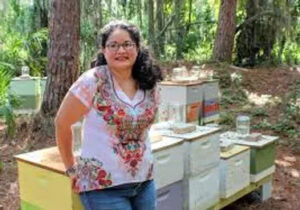Alma Johnson of Sarasota Honey Co. explains the effects of drought, weather swings and storms.
By Julie Morris and Jono Miller
Original Air Date: Nov. 1, 2023
Host: On Tuesday, WSLR’s Our Changing Environment hosts Julie Morris and Jono Miller interviewed Alma Johnson, co-owner and head beekeeper for Sarasota Honey Company. Johnson gives first-hand, professional insight into how local honey production is dropping, due to changing weather patterns.

Alma Johnson
Alma Johnson: There’s no one else in the state – that I know of – that keeps bees the way we do. We like to keep our bees in residential urban areas, so different neighborhoods will have different beehives. I find that, by having them in residential yards, they’re not exposed to chemicals a big agriculture. We do talk with the homeowners. We manage the hive, it’s called the host-a-hive program, and typically we have about three beehives per backyard. So it’s a lot more work for us, but the bees are better protected from storms because you have all these fences and you have these houses that are breaking the wind. When Hurricane Ian hit, there were a lot of beekeepers out east that lost their hives, and that got a lot of wind damage. We didn’t have those issues.
Julie Morris: So how do how do your bees respond to the really hot summer we’ve had?
AJ: 2021 and 2022 have by far been the hardest years for us and other people in agriculture. One week it’s cold and freezing, next week it’s windy, next the farmer gets hot – it’s just all over the place and it messes up the blooms. And then there’s no rain. So our bees had nectar, but they didn’t have the resources to cap it over. I didn’t want to feed them corn syrup, sugar water, or anything like that. Because the honey, to me, is altered. So I made honey water, and I fed them that, which was great. Otherwise, I was having to tell Sarasota, my markets, ‘Hey I may have to bail out for a month or so’. Because I just don’t have a crop. And I don’t feel comfortable buying honey. Different states have different regulations as to how they harvest honey and all that. And there were a lot of beekeepers in Florida that were buying stuff from Georgia. But Georgia has different rules, and it’s acceptable to have certain things in that honey show up and testing, and I just didn’t feel comfortable. I wasn’t going to compromise our quality and our reputation, by buying. …
Blooms happened late last fall and in 2021, and the blooms happened the week of the storm. So we got zero honey from the fall. So it was pretty rough. Every year, I’ll save honey. Once I get through a season, I save honey and it goes into my honey bank – just in case I need it. I never saw my honey. And so with the last two years, I’ve had to tap into that honey bank, and now that bank is gone. It’s completely gone.
Jono Miller: So beekeepers across the country have been having problems, and are going out of business. It’s a national issue, right?
AJ: It is. But I think it’s affecting more the South. The issue with the northern areas is that they are actually getting the blooms, but they only have one type of bloom, so they’ll only have like maybe one honey flow a year. Whereas here in Florida we can get three or four honey flows during a good year. So we produce a lot, we have the potential to produce a lot of honey here in Florida. The issue that we’re having is that the climate is all over the place. And so it’s hard to stay in business. So we have to work together and and make partnerships. The other reason is that people are used to paying a certain price for honey. And people can’t make a living on the price, especially with everything going up. Our jars used to cost us 30 cents, prior to COVID. Now we’re paying almost $2 for a jar and cap.
You can find and listen to the full interview on wslr.org. Click on the “Archives” tab, and search for the Tuesday, Oct. 31 edition of Our Changing Environment.
WSLR News aims to keep the local community informed with our 1/2 hour local news show, quarterly newspaper and social media feeds. The local news broadcast airs on Wednesdays and Fridays at 6pm.